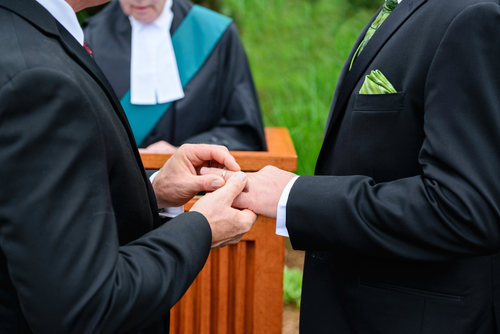Showing Up for Your Gay Friends as Their Wedding Officiant

With same-sex marriages now legal in the States, many LGBTQ couples are looking to officially formalize their union with a wedding celebration. While a visit to the local courthouse may be the quickest and easiest way to get it done, people from all walks of life dream of saying “I do” to their love in a formal ceremony in front of their nearest and dearest friends and family. While straight couples may not have trouble finding someone to marry them in a particular cultural or faith tradition, some queer couples have difficulty finding an officiant to help solemnize their union. If you know of a gay couple who are looking to get married, what better way to show support than by performing their marriage ceremony?
Becoming Ordained
You can’t officiate anyone’s wedding unless you’re ordained to perform marriage ceremonies. As an officiant, you’ll be signing the couple’s marriage license and certifying that they’re legally allowed to marry, which implies the following:
- They are of legal age to marry.
- They are not already married.
- They’re legally allowed to marry according to local laws.
You can expect that being able to certify these facts might require a formal, legally recognized process. Before you can become ordained, especially through an online process, you need to make sure that it’s legal for you to become ordained in the jurisdiction where the wedding is to take place. You also need to make sure that the jurisdiction allows same-sex marriages. While these unions are legal in the United States, local municipalities have strict but varying language regarding ordination to solemnize unions. You can’t be a great support in this way if it’s not legal for you to marry the couple. Be sure to do your due diligence here.
Understanding the Ordination Process
The reality is that you don’t need to be a judge or a minister to become ordained. These days, ordination can be achieved at little to no cost. You may have to complete a form or a short course, which may be available online. Often, organizations require officiants to adhere to a set of guidelines. If there’s a particular couple that you’d like to marry, you need to make sure that you can officiate at the planned ceremony. This probably won’t be a big issue, but details matter, and you don’t want to go through a process that isn’t compatible with the couple’s big day.
Preparing for the Big Day
Many religious traditions have scripts or basic outlines for wedding ceremonies. If you’ve been ordained through a non-religious organization, you tend to enjoy the flexibility of making the ceremony exactly what the couple wants it to be. Before the big day, get together with the couple and plan how the ceremony should go:
- Find out what matters to each party, especially cultural and religious traditions.
- Check to see if there are topics that should be avoided.
- Maintain a positive attitude and avoid making the big day more stressful for the couple and yourself.
Once you have the ceremony figured out, it is important to rehearse the things you’ll say. Familiarize yourself with all the details so that you’re not only prepared but also relaxed and not thrown off by any surprises. Stay in constant communication with the couple. As their officiant, you’re literally walking them through their commitment to each other.
While there are many wedding traditions shaped by culture and religion, the essential components of weddings are the same. Queer or straight, two people are committing to become spouses and celebrating the solemnization of their union with the people that love them. Same-sex couples are often met with hostility when looking for officiants. Stepping into that role for a couple you care for is a great way to express your love and support.














